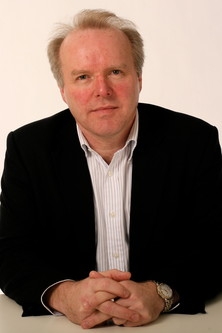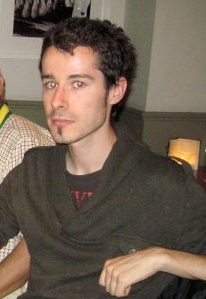 Luci Briginshaw (soprano) and Ian Pace (piano) will be performing tonight in The Performance Space, 7pm, City University London. We spent five minutes having a quick chat with Luci ahead of rehearsals:
Luci Briginshaw (soprano) and Ian Pace (piano) will be performing tonight in The Performance Space, 7pm, City University London. We spent five minutes having a quick chat with Luci ahead of rehearsals:
Firstly, please tell me a little bit about yourself and what you do?
I graduated from King’s College London, where I did an academic music degree (so not much to do with singing), ten years ago. Since then I’ve been working in an office, and on the side repeatedly trying to get into music college to study singing further. This never really happened, so I’m striking out on my own! I’m very soon going to leave my office job, and be a full-time singer, and this is thanks to my position as an official operatic busker at Covent Garden Market, which, believe or not, does now bring in enough money to live on. I do also occasionally get paid to be in opera productions!
How did you get into music and what made you pursue a career as a musician?
I’ve always wanted to be a musician for as long as I can remember. I badgered my mum to teach me the piano as soon as I was old enough to stand up and bang on the keys. She very kindly financed private piano lessons for me from the age of 5 to 18, and somewhere along that line it became clear to me that singing, and not the piano, was my true love, (although being a pianist is an invaluable aid now I am a singer).
What is it in particular that draws you to opera?
Great music sounds best when sung by a really beautiful voice, in my opinion. Opera has the best tunes, and I want to be the one that sings them!
You’ve recently performed roles such as The Queen (The Magic Flute), Clorinda (La Cenerentola) and Olympia (Les contes d’Hoffmann) as well as Mrs Rogers/Nurse in the new children’s opera My Mother Told Me Not To Stare. What has been your favourite role and why?
I am also about to sing the role of Leila in the Pearl Fishers in April, which I think will be lovely, as well as The Queen of the Night yet again in November. The Queen sings two absolutely phenomenal songs which are great fun, but as a role I couldn’t really say it’s my favourite because in reality you’re very disconnected from the rest of the cast, and spend most of the opera backstage, which is a little dull. As an experience, rather than just as a ‘role’, I would say my favourite job has been the new opera last year, as it was so special to feel I was part of creating something truly new, not just trying to emulate what thousands of sopranos had done before me. And it was also just a really great show!
Yes, creating something new is certainly a different challenge. Is that something you would like to be involved in the future, creating and presenting new operatic works?
I would love to do more contemporary work, yes; it’s very exciting to me. The only downside is it’s incredibly difficult to convince the public to come and see something new; they are very apprehensive, and worried they won’t like it. It’s such a shame that so many wonderful new pieces are being ignored.
Was it a different challenge performing specifically for children?
The challenge of performing to children had largely been taken care of by the composer and librettist, who had created a wonderfully tailor-made children’s story, with accessible music; but a challenge that I, as an actor, had to face was that all of the singing I did was performed with some kind of mask on my face. This meant that all the expression I put into had to be via movement of my body, which did take some getting used to.
It can be difficult to bring together the many hundreds of versions of well-known works when it comes to performance. How do you normally go about approaching well-known works with regards to taking influence from others, yet maintaining your own interpretation and voice?
I tend to learn a piece from the music on the score, and not listen to anyone else performing it until I have already learnt it. Having said that, for extremely well-known works, there is no avoiding the fact that you’ve heard it many times before. I think you just have to colour your interpretation with feelings that accompany the “getting inside” of that particular character – this will always result in an individual performance, because no-one else can be inside your head and therefore sing it exactly as you do.
Finally, what tips do you have for others pursuing a career in music, and more specifically opera?
If it is truly what you want to do, then don’t give up. Don’t bother taking personal offence at any criticism given. And also, although this bit can be tricky, really make sure you have the right teacher. You can waste years going to the same teacher because you like them, or they make you feel comfortable, but you should know in your heart whether or not they are advancing your technique at a noticeable speed. If not, shop around. And don’t give up! Mainly, don’t give up.
Luci will be performing a programme of Rebecca Clarke, Vincenzo Bellini, Richard Strauss, Jules Massenet and Ambroise Thomas, in the Performance Space tonight, at 7pm.
Admission is free; further details can be found at:
http://www.city.ac.uk/events/2013/january/an-evening-of-song,-passion-and-madness
 Soon to be published by Ashgate ‘Christian Congregational Music: Performance, Identity and Experience’, is co-edited by former PhD student Carolyn Landau. The volume explores the role of congregational music in Christian religious experience, examining how musicians and worshippers perform, identify with and experience belief through musical praxis. It features a chapter by current City doctoral student Mark Porter entitled ‘Moving between musical worlds: worship music, significance and ethics in the lives of contemporary worshippers.’ The volume is due to be published in July.
Soon to be published by Ashgate ‘Christian Congregational Music: Performance, Identity and Experience’, is co-edited by former PhD student Carolyn Landau. The volume explores the role of congregational music in Christian religious experience, examining how musicians and worshippers perform, identify with and experience belief through musical praxis. It features a chapter by current City doctoral student Mark Porter entitled ‘Moving between musical worlds: worship music, significance and ethics in the lives of contemporary worshippers.’ The volume is due to be published in July.




